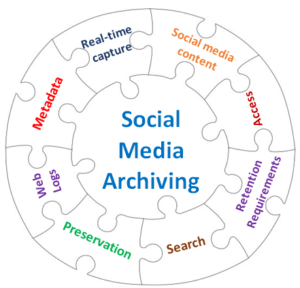Approaches to managing social media records with long-term retention periods January 29, 2018
Government use of social media are many and varied, but in total, it is used to  communicate and to engage the community regarding policies, new and existing services including service disruptions, and government projects / initiatives.
communicate and to engage the community regarding policies, new and existing services including service disruptions, and government projects / initiatives.
In our guidance “Strategies for managing social media records” we have enumerated various strategies depending on business needs and risks.
As social media platforms and technologies mature and offer more services, we recommend that agencies consider the approach of leaving social media records in its native platform or application as most of these records have short term retention requirements and the risks associated with the business are low.
We have identified some approaches on how to preserve social media records with long-term retention periods but you should only consider them if there is a business need to retain them on premise or if the records support high risk business processes.
Platform self-archiving service approach
The big social media players such as Twitter, Facebook, Youtube provide ways of letting users download content shared which is great. However, this approach is still a manual process and does not offer wriggle room if further information or customisation is needed.
Application Programming Interfaces (APIs) approach
Another approach is the use of Application Programming Interfaces (APIs) provided by social media platforms which enable access to raw social media data. This approach entails additional processing to reformat the social media data into a user-friendly format. Raw social media data are very useful though for research or information reuse purposes.
Social media archiving tool approach
The use of social media archiving tools is another approach used by some agencies. This approach seems promising as these tools claim that they enable agencies to comply with their various recordkeeping obligations including the State Records Act. However, the extent to which the tool performs archiving is based on the vendors’ definition of what archiving entails.
From a recordkeeping perspective below are some of the functional requirements we have identified that we’d want a social media archiving tool to have:
- ability to capture all records in any social media platform which includes:
- original social media posts, associated comments, likes/dislikes, hash tags, emojis and if needed, deleted posts or comments
- embedded images, videos, files and links to other websites
- ability to manage social media records captured, which includes ability to:
- tag and capture user-assigned metadata to classify or group records
- delete records
- authorise deletion of records
- identify which records need to be preserved
- prevent alteration of captured social media records
- manage access and security permissions
- ability to capture metadata regarding the post, including process capture information such as timestamp and system information
- ability to display social media records in human readable formats
- ability to export records out of the system in various formats – json, xml, html, csv, pdf.
Most importantly the social media archiving tool should have a robust search capability.
The list above is not exhaustive and may not necessarily be required in every scenario, but it provides enough information to assess social media archiving tools against recordkeeping requirements.
For information on what strategies and tools to use to manage your social media records click here.
Please contact us if you want to share your social media recordkeeping pains or preservation strategies.


Leave a Reply
You must be logged in to post a comment.